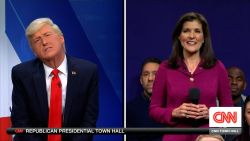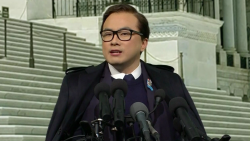Google is using its homepage to warn Australians that a proposed law designed to benefit the news media would harm their ability to search and lead to “consequences” for YouTube users.
The company published an open letter on its website on Monday, warning users that the legislation would “hurt how Australians use Google Search and YouTube.”
In the memo, Google Australia Managing Director Mel Silva claimed that the measure “could lead to your data being handed over to big news businesses, and would put the free services you use at risk in Australia.”
She argued that under the proposed law, Google (GOOGL) would have to tell news companies how they could gain access to its users’ data, while also being “given information that would help them artificially inflate their ranking over everyone else.” Regulators dispute those claims.
Google posted a link to the letter on its local homepage on Monday, serving a warning to users in Australia.
“The way you search with Google is at risk,” the message read. “The products Aussies rely on will be hurt by new government regulation.”

Another executive warned in a separate blog post this week that the regulation would lead to “consequences” for users of YouTube, which is owned by Google.
“YouTube may be obligated to give large news publishers confidential information about our systems that they could use to try to appear higher in rankings on YouTube, disadvantaging all other creators. This would mean you could receive fewer views and earn less,” wrote Gautam Anand, head of YouTube’s Asia Pacific business.
Regulators are fighting back. In a statement on Monday, the Australian Competition and Consumer Commission (ACCC) accused the company of spreading “misinformation” in its open letter.
“Google will not be required to charge Australians for the use of its free services such as Google Search and YouTube, unless it chooses to do so,” it said. “[And] Google will not be required to share any additional user data with Australian news businesses unless it chooses to do so.”
Google hit back in a statement Monday, saying that “we strongly disagree” with the characterization of its letter.
“We did not say that the proposed law would require us to charge Australians for Search and YouTube - we do not intend to charge users for our free services,” a spokesperson said. “What we did say is that Search and YouTube, both of which are free services, are at risk in Australia.”
Google also disputed that it would not be required to start sharing more data with media companies. It maintained that the legislation “goes beyond the current level of data sharing” between the two sides.
Rising tensions
The latest exchange marks an escalation of animosity between the two parties. Last month, regulators released draft legislation that would let news publishers in the country negotiate compensation with Google and Facebook (FB) for sharing or displaying their stories. Both tech firms expressed their concern.
The new law would allow certain media outlets to bargain either individually or collectively with Facebook and Google — and to enter arbitration if the parties can’t reach an agreement within three months, according to the ACCC, which put out the proposed legislation.
That process would involve an independent arbitrator looking at offers from both sides and settling the matter within 45 business days.
Regulators say the move is needed to level the playing field for the news media in Australia. Since January 2019, more than 200 newsrooms across the country have reduced service, closed temporarily or permanently shut down, according to estimates from the Australian Newsroom Mapping Project, which is run by the Public Interest Journalism Initiative, a local nonprofit group.
Facebook said last month that it was “reviewing the government’s proposal to understand the impact it will have on the industry, our services and our investment in the news ecosystem in Australia.” The company declined to comment further on Monday.
Google has taken a more forceful approach. Silva has previously said that “the government’s heavy handed intervention threatens to impede Australia’s digital economy and impacts the services we can deliver to Australians.” Her letter this week doubled down on those concerns.
The outcome of the proposal is likely to be closely watched across the globe. Other countries have previously passed legislation to try and force internet giants to pay publishers — albeit with limited effect.
The proposed law is currently undergoing a public consultation phase, after which it will be finalized and put forward to the Australian parliament.
On Monday, the ACCC said it would “continue to consult on the draft code with interested parties, including Google.”
— Angus Watson and Kerry Flynn contributed to this report.


























